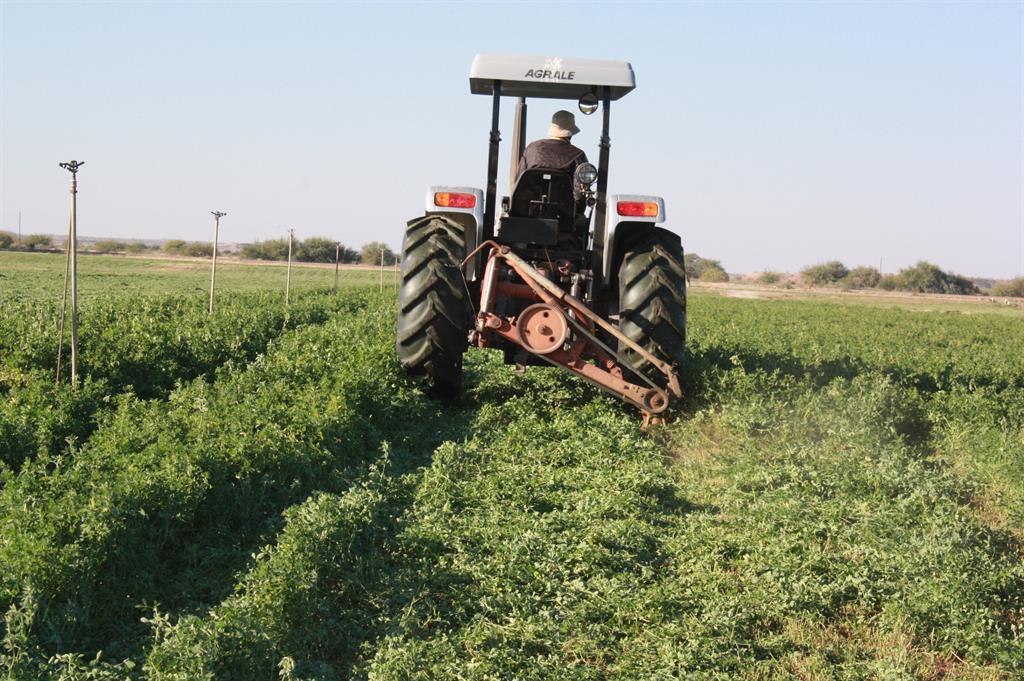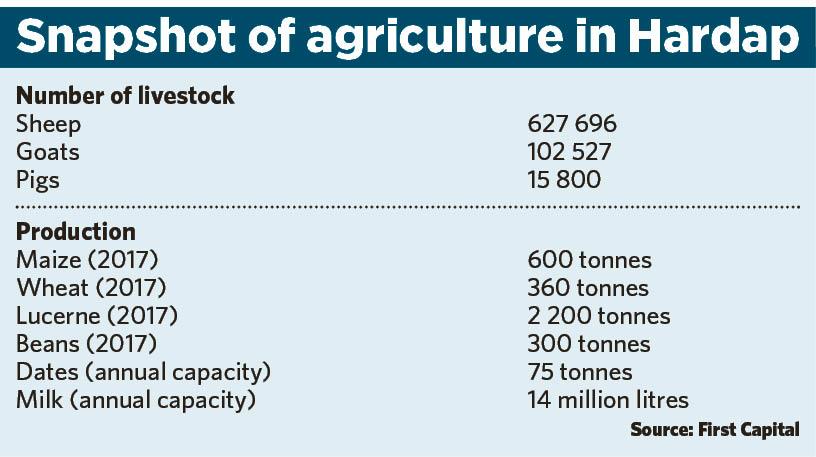Manufacturing could boost Mariental
Most of Mariental's inhabitants fall into the working age category, highlighting the availability of employable individuals for industries in the town, First Capital says.
Jo-Maré Duddy
Manufacturing at Mariental has a lot of potential, but needs strategic measures to grow its processing and value-adding capacity of the raw agricultural products stemming from the Hardap region, First Capital Namibia says.
The local investment group has just released its Economic Profile for Mariental, saying the town's value addition in terms of manufacturing activities is moderate as most commodities produced locally are processed in other towns.
“For instance, milk is sent to Windhoek (Avis plant) while pork and bacon are both sent to meat processors outside the Hardap Region,” First Capital's report states.
Using the population growth of 2.4% per annum used by the Namibia Statistics Agency in the 2011 National Census, First Capital estimates 14 386 people lived at Mariental in 2017. “This represents an absolute population increase of 1 908 over a six-year period between 2011 and 2017.”
According to the group's calculations, the population grew by 345 to reach 14 731 this year.
Mariental has a median population age of 24 years, which is above the national median age of 21 years indicating that the population in the town is older than the national average age, First Capital says.
Children below four years account for 12% of the town's inhabitants, while those aged between five and 14 represents 21% of the population. About 62% of Mariental's inhabitants are working age.
Employment
First Capital's research estimates the town's labour force at 6 333 people, representing a labour force participation rate (LFPR) of 71%.
“Higher LFPR indicates lower dependence rate which is an ideal demographic situation for a developing country grappling with high poverty levels like Namibia. In the case of Mariental, the LFPR is above the national indicating that more individuals are available to work,” the report states.
First Capital reckons 3 863 individuals or 61% of Mariental's labour force population have jobs.
The resulting unemployment rate of 39% is above the rate of 36% derived in the 2011 National Census and the national unemployment rate of 34%. “Our research found that the unemployment rate edged up from 36 percent estimated by the 2011 National Census mainly due to job losses in agriculture, construction and wholesale retail sectors.
Income, housing
About 75% of Mariental households rely on wages and salaries as their main source of income – more than the national urban population average of 72% - followed by business and non-farming activities, as well as old age pension.
First Capital says the Mariental municipality has made progress over the years towards the delivery of houses.
About 0.8% of residents are living in traditional structures in Mariental which is lower than the national average. A significant number of residents in Mariental - 30.4% - are living in impoverished (shacks) structures, while about 48.6% of families live in detached structures or stand-alone houses), according to the report.
First Capital estimates the total demand for households that need houses at 2 922.
“This is comprised of a total of 1 810 families that live in impoverished houses. Also included is 502 families that are renting either from private landlords or employers. Furthermore, we also estimated that about 610 families who are either living outside the town of Mariental who need houses. These includes individuals from Mariental who work in rural areas or happen to work in other parts of the country,” the report states.
Economy
First Capital says Mariental's economy is private sector driven.
“The rapid growth in local infrastructure developments indicates the future growth potential of the town's economy.”
Despite its growing agricultural farming base, access to financing, especially for communal farmers, remains a challenge to enhance the potential further, First Capital says.
Mariental's population concentration in the working age population highlights the availability of employable individuals for industries in the town, the group adds.
“Given the small population of Mariental, there is need for more public and private sector investments to provide opportunities which will attract people and investors to the town, thus boosting the town's economy in the long run,” First Capital says.
The available water resources from the Hardap Dam provide an opportunity to development in the town, it concludes.
Manufacturing at Mariental has a lot of potential, but needs strategic measures to grow its processing and value-adding capacity of the raw agricultural products stemming from the Hardap region, First Capital Namibia says.
The local investment group has just released its Economic Profile for Mariental, saying the town's value addition in terms of manufacturing activities is moderate as most commodities produced locally are processed in other towns.
“For instance, milk is sent to Windhoek (Avis plant) while pork and bacon are both sent to meat processors outside the Hardap Region,” First Capital's report states.
Using the population growth of 2.4% per annum used by the Namibia Statistics Agency in the 2011 National Census, First Capital estimates 14 386 people lived at Mariental in 2017. “This represents an absolute population increase of 1 908 over a six-year period between 2011 and 2017.”
According to the group's calculations, the population grew by 345 to reach 14 731 this year.
Mariental has a median population age of 24 years, which is above the national median age of 21 years indicating that the population in the town is older than the national average age, First Capital says.
Children below four years account for 12% of the town's inhabitants, while those aged between five and 14 represents 21% of the population. About 62% of Mariental's inhabitants are working age.
Employment
First Capital's research estimates the town's labour force at 6 333 people, representing a labour force participation rate (LFPR) of 71%.
“Higher LFPR indicates lower dependence rate which is an ideal demographic situation for a developing country grappling with high poverty levels like Namibia. In the case of Mariental, the LFPR is above the national indicating that more individuals are available to work,” the report states.
First Capital reckons 3 863 individuals or 61% of Mariental's labour force population have jobs.
The resulting unemployment rate of 39% is above the rate of 36% derived in the 2011 National Census and the national unemployment rate of 34%. “Our research found that the unemployment rate edged up from 36 percent estimated by the 2011 National Census mainly due to job losses in agriculture, construction and wholesale retail sectors.
Income, housing
About 75% of Mariental households rely on wages and salaries as their main source of income – more than the national urban population average of 72% - followed by business and non-farming activities, as well as old age pension.
First Capital says the Mariental municipality has made progress over the years towards the delivery of houses.
About 0.8% of residents are living in traditional structures in Mariental which is lower than the national average. A significant number of residents in Mariental - 30.4% - are living in impoverished (shacks) structures, while about 48.6% of families live in detached structures or stand-alone houses), according to the report.
First Capital estimates the total demand for households that need houses at 2 922.
“This is comprised of a total of 1 810 families that live in impoverished houses. Also included is 502 families that are renting either from private landlords or employers. Furthermore, we also estimated that about 610 families who are either living outside the town of Mariental who need houses. These includes individuals from Mariental who work in rural areas or happen to work in other parts of the country,” the report states.
Economy
First Capital says Mariental's economy is private sector driven.
“The rapid growth in local infrastructure developments indicates the future growth potential of the town's economy.”
Despite its growing agricultural farming base, access to financing, especially for communal farmers, remains a challenge to enhance the potential further, First Capital says.
Mariental's population concentration in the working age population highlights the availability of employable individuals for industries in the town, the group adds.
“Given the small population of Mariental, there is need for more public and private sector investments to provide opportunities which will attract people and investors to the town, thus boosting the town's economy in the long run,” First Capital says.
The available water resources from the Hardap Dam provide an opportunity to development in the town, it concludes.




Kommentaar
Republikein
Geen kommentaar is op hierdie artikel gelaat nie